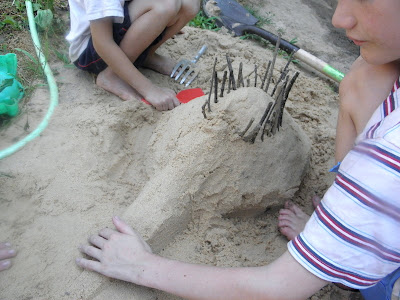Kindling the Fire about Anglo-Saxon England (500-1100)
This week we studied Anglo-Saxon England. To me history is all about tapping into the story part of it and activating the imagination with story, and then providing an outlet for this imagination through something they can manipulate.
"The mind is not a vessel to be filled,
it is a fire to be kindled."
-Plutarch
 My oldest read to them from The Art and Industry of Sandcastles.
My oldest read to them from The Art and Industry of Sandcastles. "Saxon forts were not what we think of as castles; they were only wooden stockade walls on a mount built up from the earth taken out of the moat, a narrow bridge approached the single gate. The chief and his soldiers lived within it, protected by the moat, mound walls, and their own arrows and swords. The times were violent, the warlord had to protect his men, his treasure and his life."
They then went to the backyard sand pile and my oldest helped them make a Saxon fort...
 from sand and sticks.
from sand and sticks.They were very pleased with their efforts...
 and they brought out little plastic men and pretended to be Saxons defending their fort from invaders.
and they brought out little plastic men and pretended to be Saxons defending their fort from invaders. My second student chose to write about King Alfred.
My second student chose to write about King Alfred.We read from A Child's History of the World and The Usborne Encyclopedia of World History. Some people don't like the Usborne book, but my boys all love it and it seems to excite their interest and imagination, so it is a staple at our house. They watched King Alfred's Cakes from The Adventures from The Book of Virture: Courage.
They colored maps and wrote copywork and narrations.
 Student map work
Student map work My third student chose to write about where the Angles and Saxons came from and where they settled, adding notes to his map. He struggles with his handwriting, so he types his reports on the computer.
My third student chose to write about where the Angles and Saxons came from and where they settled, adding notes to his map. He struggles with his handwriting, so he types his reports on the computer.Here is a story you might want to read at this time, The Little Duke, which is about Richard, Duke of Normandy, great-grandfather of William the Conqueror.
Black Horses for the King is also a wonderful book about a Celtic lad in service to King Arthur set in fifth-century Britain, as they wage war against the Saxons.

